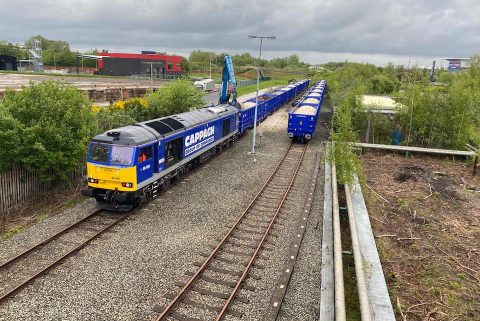Container stop Port of Rotterdam due to railway disruption Germany

The Rail Service Center (RSC) of the port of Rotterdam has issued a submission stop of containers with north-Italian cities Busto Arsizio and Novara as a destination. This is a direct consequence of the disruption on the Karlsruhe-Basel railway line, which will last until the 7th of October. Alternative routes are only partially available, resulting in backlogs at the terminal. The RSC rarely issues a submission stop and considers the situation one of the biggest disruptions experienced so far.
On the 12th of August, water and soil penetrated part of the new Rastatt tunnel in Germany. As a result, the ground subsided and the railway tracks above the tunnel warped. The consequences for the rail freight sector have been immense. The Karlsruhe-Basel railway line is part of the important north-south corridor connecting the ports of Rotterdam, Hamburg and Antwerp with Switzerland and Italy. Alternative routes are only becoming accessible gradually and are subjected to limited availability.
Submission stop
A customer service representative who wished to remain anonymous confirmed on Monday that the RSC had issued a submission stop on Friday the 25th of August, at 16.30. “We had looked into the possibility several times and decided to temporarily stop the submission of new cargo with this destination, as the terminal is overloaded”, he said.
“It is currently not clear for how long the submission stop will be in place, we are considering the situation on a day-to-day basis. This week things are starting to move, as more train operators find suitable alternatives. But it is really up to the operators whether they find a suitable route to take out their cargo.”
Rare measure
According to people involved in the rail freight industry, a submission stop is a rare measure for the RSC. “I cannot recall that a submission stop has been issued during my career. The RSC is reluctant in taking such measures, as it can damage their reputation. Moreover, once things are starting to move, a submission stop can cause delays”, said Mark Jansen, operational director at Hupac during a webinar about the railway disruptions on Friday, organized by News Agency Transport (Nieuwsblad Transport).
“There must be a really good reason to take such step”, confirmed the customer representative at the RSC. “I think this is the biggest disruption within the rail freight sector I have witnessed so far.” The biggest challenge for the RSC in facing the disruption on the north-south axis is the storage of semi-trailers, an important unit for the rail freight industry in this direction. “Semi-trailers cannot be stored on top of each other, and it is especially this unit that is important for the market”, he explained.
Financial damage
Due to the submission stop the terminal faces losses of millions of Euros. “We transport around 4,500 units per week, but we are missing out on maybe twenty per cent right now. Each transfer that we miss is a bill. I cannot speak of our losses in numbers just yet, but there is serious money involved”, the terminal employee revealed.
Currently, the RSC is among several parties seeking compensation for the losses, a process which is due to take time as the options are not yet fully clear. Hans-Willem Vroon of RailGood, a Dutch railway lobbyist recommended parties to make up their loss claims and discover these options.
Compensation
Deutsche Bahn commented that several short-term measures for railway undertakings are already offered, but did not elaborate on the payment of damage claims. “Diversions are governed by what is known as the “cheapest train-path” principle, i.e. the railway undertakings pay for the train path which would have been cheapest, even if the diversion that is used is more expensive”, the railway company said.
Furthermore, no cancellation fees are charged by the company, customers who wish to switch train paths do not pay for the change and no charges are levied if customers have to use service facilities (stations etc.) on a diversion route or one of the six diesel tender engines for the Tübingen-Horb freight diversion route.
Read more:





